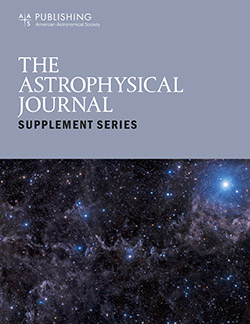南方双星x射线源的光谱能量分布
IF 8.5
1区 物理与天体物理
Q1 ASTRONOMY & ASTROPHYSICS
引用次数: 0
摘要
x射线双星(XRBs)的快速变化产生了广泛的x射线状态,这些状态与电磁波谱上的活动有关。特别具有挑战性的是,要研究足够大的源样本,以包括所有类型的各种状态,并覆盖显示通量密度变化的全部频率范围。许多望远镜同时观测是必要的。在这个项目中,我们用7个望远镜在5 × 10 9到10 19 Hz的电磁波谱范围内监测48个XRBs,包括地面无线电、红外和光学天文台,以及两个航天器上的5个仪器,为期1周。我们构建了20个具有最广泛探测的源的光谱能量分布和匹配的x射线色强图。我们的观测结果与针对不同类别提出的预期行为的几个模型是一致的:我们没有探测到脉冲星或环礁源的显著射电发射,但我们确实探测到了正常或水平分支Z源的射电发射,以及处于高/软、低/硬和静止状态的黑洞的射电发射。调查数据为预测来自不同来源的行为的更详细的模型提供了有用的约束。本文章由计算机程序翻译,如有差异,请以英文原文为准。
Spectral Energy Distributions of Southern Binary X-Ray Sources
Abstract The rapid variability of X-ray binaries (XRBs) produces a wide range of X-ray states that are linked to activity across the electromagnetic spectrum. It is particularly challenging to study a sample of sources large enough to include all types in their various states, and to cover the full range of frequencies that show flux density variations. Simultaneous observations with many telescopes are necessary. In this project, we monitor 48 XRBs with seven telescopes across the electromagnetic spectrum from 5 × 10 9 to 10 19 Hz, including ground-based radio, IR, and optical observatories, and five instruments on two spacecraft over a 1 week period. We construct spectral energy distributions and matching X-ray color–intensity diagrams for 20 sources that have the most extensive detections. Our observations are consistent with several models of expected behavior proposed for the different classes: we detect no significant radio emission from pulsars or atoll sources, but we do detect radio emission from Z sources in the normal or horizontal branch, and from black holes in the high/soft, low/hard, and quiescent states. The survey data provide useful constraints for more detailed models predicting behavior from the different classes of sources.
求助全文
通过发布文献求助,成功后即可免费获取论文全文。
去求助
来源期刊

Astrophysical Journal Supplement Series
地学天文-天文与天体物理
CiteScore
14.50
自引率
5.70%
发文量
264
审稿时长
2 months
期刊介绍:
The Astrophysical Journal Supplement (ApJS) serves as an open-access journal that publishes significant articles featuring extensive data or calculations in the field of astrophysics. It also facilitates Special Issues, presenting thematically related papers simultaneously in a single volume.
 求助内容:
求助内容: 应助结果提醒方式:
应助结果提醒方式:


